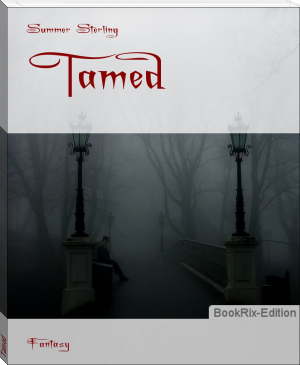The Atlantic Book of Modern Plays, Gordon Bottomley et al. [kiss me liar novel english .TXT] 📗

- Author: Gordon Bottomley et al.
Book online «The Atlantic Book of Modern Plays, Gordon Bottomley et al. [kiss me liar novel english .TXT] 📗». Author Gordon Bottomley et al.
"Every one suddenly burst out singing."
The other two think the happy soldier mad. We are left wondering what the reaction will be from this height of joyful release to the harsh and sombre conditions of workingmen's life after the peace.
The silver badge represents a discharge for wounds. Crumps are, of course, shells.
Louise Sounders: THE KNAVE OF HEARTS
The Knave of Hearts is one of the happy tradition of puppet-plays, which come down in unbroken line from the most ancient history, through the illustrious Dr. Faustus and Mr. Punch, to new and even greater favor and fame to-day. For just as the ancient puppet-shows of Italy and England seemed to be losing ground before the moving-picture invasion, they have been heroically rescued by Mr. Tony Sarg,—whose performance of Thackeray's The Rose and the Ring is perfectly absurd and captivating,—and by other excellent artists.
Puppet-shows are delightful because they are easily made and quite convincing. Very good ones have been improvised even by tiny children, with a pasteboard suit-box opening to the front, a slit at the top to let down paper-doll actors on a thread, a bit of scenery, outdoors or in, drawn as background, and a showman to talk for all the characters. Still better puppets are doll heads and arms of various sorts, dressed in flowing robes and provided with holes for two fingers and a thumb of the operator, who moves them from below. They can be made to dance and antic as you like on a stage above the showman's head, as Punch and Judy have always done. The more elaborate marionettes are worked with strings from above, so that they can open and close their mouths and otherwise act most realistically; these are, of course, more difficult, but quite possible to make. In such simple theatres, Goethe and Robert Louis Stevenson and many other famous people played themselves endless stories. If you want to pursue this idea further, a list of references below gives you opportunity for all the information you like about marionettes and puppets.
The Knave of Hearts is charming, either as a puppet-play or, as a class in junior high school gave it recently, a "legitimate drama." The remarks of the manager are all the funnier when applied to real characters. The play explains clearly the reasons for the strange behavior of a respectable nursery character. It is to be published soon in a book of its own with illustrations by Mr. Maxfield Parrish (Scribner's). The author has written other plays and stories, some of which you may have seen in St. Nicholas, and also a pleasant operetta, with music by Alice Terhune—The Woodland Princess, listed in the bibliography following. She is also an actress with the New York Comedy Club, an excellent amateur organization.
Pompdebile's coat of arms, with a heart rampant (i.e., standing on its hind legs, however that may be accomplished), reminds one of the arms suggested for the old clergyman-scholar, Mr. Casaubon, in George Eliot's Middlemarch—"three cuttlefish sable and a commentator rampant."
Lord Dunsany: FAME AND THE POET
Lord Dunsany (Edward Moreton Max Plunkett), the eighteenth baron of his name, is the author of a number of stories and plays unique in their type of clever imaginativeness. Besides the inimitable Five Plays and other dramas listed in the bibliography, his best writings are to be found in Fifty-One Tales, which includes "The Hen," "Death and Odysseus," "The True Story of the Hare and the Tortoise," and other highly entertaining matters. Fame and the Poet, originally published in the Atlantic, has been recently produced with good effect by the Harvard Dramatic Club. Fame's startling revelation to her faithful worshiper of her real nature and attributes is naturally most distressing—even more so, perhaps, than the rendezvous which this same goddess appointed another poet, in the Fifty-One Tales: "In the cemetery back of the workhouse, after a hundred years."
Lord Dunsany was a captain in the First Royal Iniskilling Fusileers—a regiment mentioned in Sheridan's Saint Patrick's Day—and saw service in Syria and the Near East as well as on the western front. He was wounded on April 25, 1916, in Flanders. Since the war he has visited the United States and seen a performance of his Tents of the Arabs at the Neighborhood Playhouse, New York City.
Beulah Marie Dix: THE CAPTAIN OF THE GATE
Miss Dix is author of several plays—in addition to those from Allison's Lad included in the play-list, of Across the Border, and, with the late Evelyn Greenleaf Sutherland, of the frequently acted Rose of Plymouth Town. She has also written several favorite historical stories, including Merrylips. The Captain of the Gate is a tragedy of Cromwell's ruthless devastation of Ireland. The determined and heroic captain surrenders, to face an ignominious death, to keep his word and ensure delaying the advance of the enemy upon an unprepared countryside, and his courage inspires exhausted and failing men to like heroism. This is an effective piece of dramatic presentation.
Percy Mackaye: GETTYSBURG
Mr. Percy Mackaye has been most active in the movement for a community theatre in the United States and for the revival of pageantry. He contends rightly that this development might be one of the strongest possible influences for true Americanism, and his dramatic work has all been directed toward such a theatre. Most notable are his pageants and masques, particularly Caliban by the Yellow Sands, for the Shakespeare Tercentenary; his play The Scarecrow, a lively dramatization of Hawthorne's Feathertop; his opera Rip van Winkle, for which Reginald De Koven composed music; and The Canterbury Pilgrims, in which the Wife of Bath is the heroine of further robustious adventures. Mr. Mackaye is also translator, with Professor Tablock, of the Modern Reader's Chaucer. The little sketch presented here is taken from a volume of Yankee Fantasies, in which various observations of past and present New England life are recorded. Stephen Crane's The Red Badge of Courage, a powerful story of the Civil War, is a most excellent help to realizing what the boy Lige really endured in those days of battle.
Mr. Mackaye has adopted here a regularly rhythmic verse without the conventional capital letters at the beginnings of lines —perhaps to typify the simple homeliness of the talk.
Harold Brighouse: LONESOME-LIKE
Mr. Brighouse has been best represented in this country by an excellent comedy, Hobson's Choice, which was widely played and was printed in the Drama League series of plays (1906). His other best-known work here is the present play, and The Price of Coal (1909), a picturing of the hard life of miners' wives and their Spartan firmness in expectation of fatal accidents. He has produced and published a number of other plays, among them those listed in the bibliography. Mr. Brighouse represents in this volume the work of the English Repertory theatres, which parallel the Abbey Theatre in Dublin, the Glasgow Repertory Theatre, and various European stage-societies. That at Manchester, with which he has been associated, is directed by Miss Isabel Horniman, has seen beautiful stage-settings designed by Mr. Robert Burne-Jones, and counts among its dramatists such well-known men as Messrs. Allan Monkhouse, author of Mary Broome, a sombre and powerful tragedy; Stanley Houghton, and Gilbert Cannan. The Liverpool Theatre has become even more famous through the dramatic work of Mr. John Drinkwater. The Little Theatre movement in this country, our Drama League, and the various dramatic societies in our colleges and cities are our nearest parallel to these repertory theatres.
Lonesome-Like, Mr. Brighouse's most effective short play, is written in a modified Lancashire dialect, the speech of the village weavers and spinners. Many of the words are English of Elizabethan days and earlier, derived mostly from Anglo-Saxon.
Gradely (graithly) means willingly, meekly or decently; clem means starve; sithee is see you or look you; clogs are shoes with wooden soles and leather uppers, and dungarees, garments of coarse cotton cloth rather like overalls. A is used throughout for I.
As in many English stories, an extreme and painful dread of the workus, or poorhouse, provides a strong motive force.
John Millington Synge: RIDERS TO THE SEA
The work of the Irish Renaissance in the Abbey Theatre in Dublin reached its most powerful and tragic height in this tragedy, which Mr. Yeats compared to the Antigone and (Edipus of Sophocles). Synge at first wandered about Europe, poetizing; it was Yeats who brought him back to study and embody in genuine literature the poetry of life among his own people. On the bleak Arran Islands he lived in a fisherman's cottage, and through the floor of his room heard the dialect which he presents in simple and poignant beauty in this drama of hopeless struggle. The "second sight"—called "the gift" in Campbell of Kilmhor, and an incident also in The Riding to Lithend—was a sort of prophetic vision altogether credited among Celtic peoples, as among those of Scott's Lady of the Lake. When the mother sees the "riders to the sea,"—her drowned son and her living son riding together,—she feels convinced that he must soon die. The sharp cries of her grief and, above all, the peace of her resignation at the end, after all hope is gone, make this, as a writer in the Manchester Guardian is quoted as calling it, "the tragic masterpiece of our language in our time; wherever it has been in Europe, from Galway to Prague, it has made the word tragedy mean something more profoundly stirring and cleansing to the spirit than it did."
The speech of the people is not difficult to understand when you master a few of its peculiarities. One is the omission of words we generally include, as in, "Isn't it a hard and cruel man (who) won't hear…." Another is the common form "It was crying I was." A few phrases, like what way for how, the way for so that, in it for here or near, and itself for even, or with no particular meaning, as "Where is he itself?" The meanings of other words will be easily untangled.
William Butler Yeats: THE LAND OF HEART'S DESIRE
Mr. Yeats's best poetic dramas, and particularly this one, represent beyond question that "apex of beauty" to which Lady Gregory spoke of the Abbey Theatre dramatists as aspiring. This play is not founded on any particular Irish folk-tale. It is filled with the half-dread, half-envy with which the tellers of Irish legends seem to regard the fate of mortals bewitched by the Leprechaun or Good People. It is rich, too, with the music of beautiful words, without which, Mr. Yeats contends no play can be "of a great kind." He says too, "There is no poem so great that a fine speaker cannot make it greater, or that a bad ear cannot make it nothing."
Mr. Yeats has written broad comedy like Synge's Shadow of the Glen and Lady Gregory's Irish Comedies; his Pot of Broth is a most clever retelling of an old, comical tale. But it is by his mystical and poetical plays that he would be judged as playwright and poet—particularly Deirdre, which should be compared with Synge's Deirdre of the Sorrows; The Unicorn of the Stars, written in collaboration with Lady Gregory; Cathleen Ni Hoolihan, a dramatization of the spirit of Ireland; The King's Threshold, a high glorification of the poet's art, with a fable, based on an ancient Celtic rite, of the hunger strike; and The Land of Heart's Desire, most beautifully perfect of all.
Gordon Bottomley: THE RIDING TO LITHEND
"The Riding to Lithend is an Icelandic play taken out of the noblest of the Sagas," wrote Mr. Lascelles Abercrombie in his review of the published drama in 1909. "[It] is a fight, one of the greatest fights in legend…. The subject is stirring, and Mr. Bottomley takes it into a very high region of poetry, giving it a purport beyond that of the original teller of the tale…. [The play] is not a representation of life; it is a symbol of life. In it life is entirely fermented into rhythm, by which we mean not only rhythm of words, but rhythm of outline also; the beauty and impressiveness of the play do not depend only on the subject, the diction, and the metre, but on the fact that it has distinct and most evident form, in the musician's sense of the word. It is one of those plays that reach the artist's ideal condition of music, in fact."
This is high praise; but who, after studying the play, will doubt that it is deserved? The powerfully moving events of the story indeed lead up to the climax in a forthright and exciting manner. The terror of the house-women and the thrall, the fearful love of Gunnar's mother Rannveig, and the caution of Kolskegg his brother, who "sailed long ago and far away from us" in obedience to the doom or sentence of the Thing—all these bring out sharply the quite reckless daring of Gunnar





Comments (0)